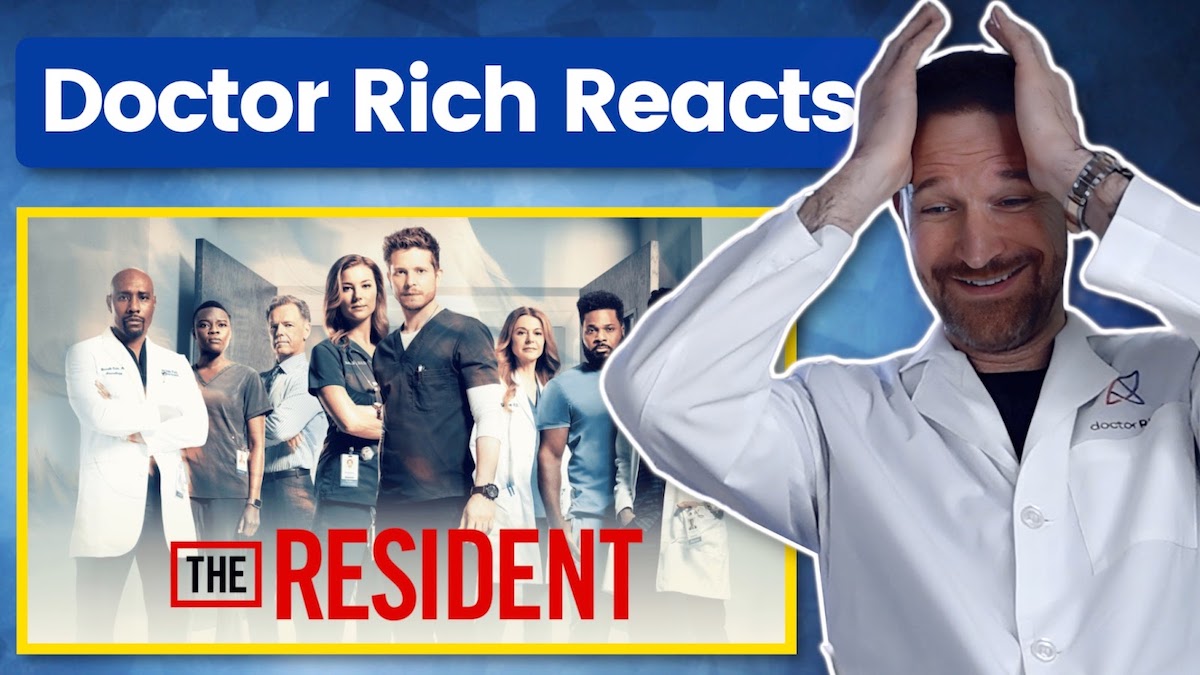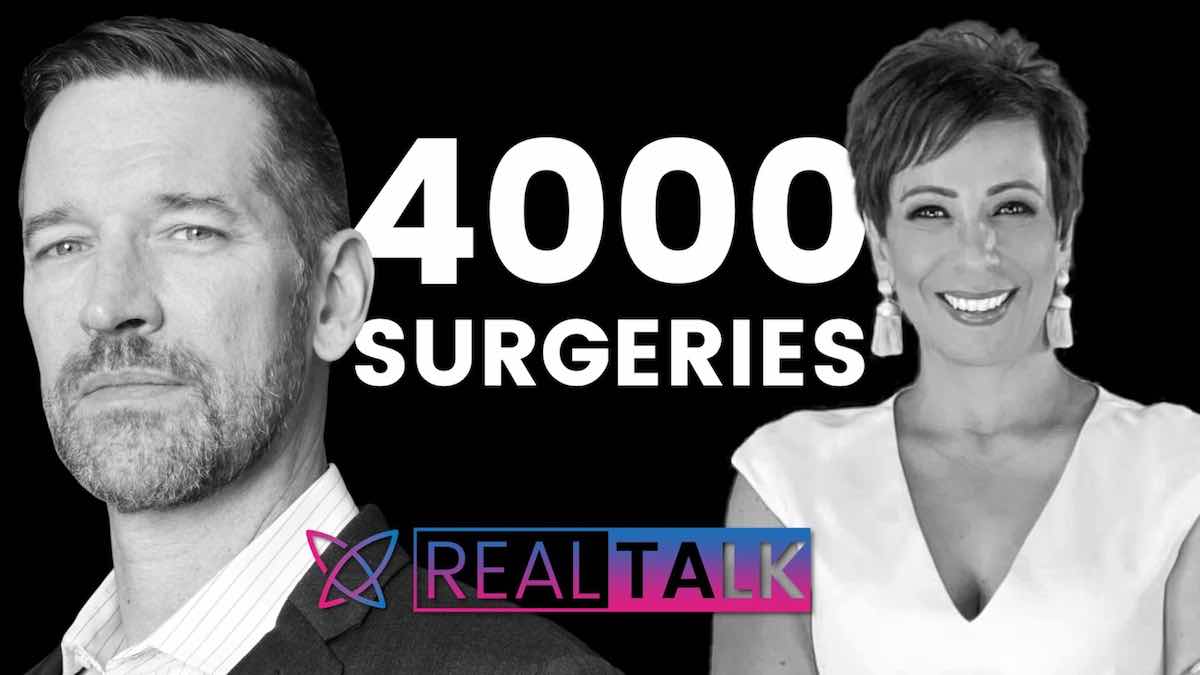Anesthesia and Surgery: Best Frenemies?
Welcome back to the Doctor Rich Channel. Today we have Dr. Erica Horton in the studio to help us decipher Dr. Glaucomflecken’s “How to ace your anesthesiology residency interview.”
Don’t have time to read this post? Watch the video here instead!
Doctor Rich [to Dr. Horton]:
Thanks for coming!
Dr. Horton:
Hi! Thanks for having me!
Doctor Rich:
Shall we check this out?
Dr. Horton:
Absolutely.
[Video begins with an anesthesia doctor behind a surgical drape. An anesthesia resident joins the first doctor behind the drape. Both characters are played by Dr. Glaucomflecken.]
Resident:
Hey, I’m here for the interview.
Anesthesia:
Oh, hey, come on in. Are you having a good interview day so far?
Resident:
Oh, yeah. We just heard a great talk on how to break bad news…
Anesthesia [confused]:
To patients?
Resident:
Oh, no — to surgeons when you have to cancel their case.
Anesthesia
Oh, okay. Well, tell me why you want to go into anesthesia!
Resident:
Well, when I was a kid, I was heavily involved in competitive cord untangling…
Anesthesia [impressed]:
Really?
Resident [proudly]:
Yeah — three times state champ!
Doctor Rich:
So, uh, breaking bad news to the surgeon…
Dr. Horton:
This is true!
Doctor Rich:
That’s a bane… I think it’s a mutual responsibility. As the surgeon, I always try to get my patient as optimized as possible…
Dr. Horton:
The keyword is “optimized.”
Doctor Rich:
…and you can’t ever be completely cleared — but to make sure their heart’s healthy, their kidney function is good (or at least medically optimized to be able to tolerate whatever the surgery is).
Dr. Horton:
Yes.
Doctor Rich:
So how often do you find that you’re in that circumstance, and how does that “breaking of the news” go?
Dr. Horton:
Hm… It just depends which surgeon it is and how often that happens.
Doctor Rich:
Yeah. Some, some less prepared than others?
Dr. Horton:
Some are frequent flyers, unfortunately for their patients…
Doctor Rich:
Oof! Well, you’d think they’d know they’ve gotta get cardiac clearance.
Dr. Horton:
Well… Sometimes they think if you argue enough, then they can push it through…
Doctor Rich:
Ah…
Dr. Horton:
Well, I hate to do it! You know, patients have gone through a lot to show up on the day of surgery.
Doctor Rich:
Well, and I’m sure there’s some cases that the medical acuity is such that even if they’re not optimized, we still have to do the case…
Dr. Horton?
In an emergency? Absolutely.
Doctor Rich:
What about “competitive cord untangling?” There’s a lot of cords in the OR!
Dr. Horton [laughing]:
Yes, there are!
Anesthesia:
What would an ideal workday look like for you?
Resident:
Three minutes of sheer panic followed by eight hours of excruciating boredom.
Anesthesia:
What’s the first rule of anesthesia?
Resident:
Secure the airway.
Anesthesia:
What’s the second rule of anesthesia?
Resident:
Don’t go into a long surgery without a fully charged phone.
Anesthesia:
What’s your greatest fear?
Resident:
The drape falling down and everybody seeing how easy my job is 95% of the time.
Doctor Rich:
So I think that could be said for a lot of medical specialties though…
Dr. Horton:
I agree.
Doctor Rich:
I mean, I don’t practice OB — but as an OB/GYN, it’s pretty routine most of the time. And then it can be sheer terror…
Dr. Horton:
Yeah! You want it to be kind of boring because it’s straightforward and practiced, but that’s not always…
Doctor Rich:
What are some of the scary times with anesthesia? What can happen? Or is that all because of the surgeon [laughing]?
Dr. Horton:
No, no, not at all! Losing an airway, for sure. Like it said, “Rule one: Secure the airway.” That’s probably, you know, that’s our number one expectation.
Doctor Rich:
And a charged phone?
Dr. Horton [jokingly]:
Right. That’s two, and then that’s two. Yeah. Airway, one.
Doctor Rich:
Then the wifi.
Dr. Horton:
Yeah.
Anesthesia:
Where do you see yourself in five years?
Resident:
You mean, other than on a break?
Anesthesia:
And my last question: How do you feel about swallowing your pride?
Resident:
Why?
Surgeon [announcing from the other side of the drape]:
Attention, Anesthesia! I require the bed height to be elevated three and a half inches. Thank you.
Doctor Rich:
Do I sound like that?
Dr. Horton [laughing]:
Story of my life!
Doctor Rich:
Well, it just depends on the rapport and the delivery!
Dr Horton:
Yeah. Absolutely.
Doctor Rich:
So “Minion, raise my bed” as opposed to, you know, “Help me out.”
Dr. Horton:
Or just “Anesthesia,” right? You know, our name is “Anesthesia.”
Doctor Rich:
Unless your last name is literally Anesthesia, you should probably learn your providers’ names.
Dr. Horton:
And usually — thank God — we know each other well enough that we use each other’s first names, and that feels a lot more…
Doctor Rich:
You’ve probably been in an OR where someone feels “better” than you…
Dr. Horton:
I could say a lot of names right now… but I won’t.
Doctor Rich [jokingly]:
Leave that for the blooper reel!
Anesthesia:
That’s why. Watch this…
[to Surgeon] Yes, Surgeon! Right away! [Anesthesia makes a buzzing noise with his mouth but doesn’t do anything to the bed] How’s that?
Surgeon:
Yes, that’ll do.
Doctor Rich [laughing]:
Do you do that?
Dr. Horton [laughing]:
No! Usually the remote doesn’t work, and the bed doesn’t move, and I look like an idiot — like I can’t run a remote control, but…
Doctor Rich
There are fancy bed controls now! Especially with all the robotics — it’s like I need an advanced degree to figure out how to interact with the remote. So that’s when the anesthesia tech comes in, and “bloop, bloop, bloop,” you’re done…
Dr. Horton
Right?
Doctor Rich:
…and makes me look silly!
Resident:
How did you do that?!
Anesthesia:
Surgeons don’t actually need anything — they just want to feel like they’re at the center of the known universe.
Resident [awed by Anesthesia’s knowledge]:
Incredible!
Doctor Rich [laughing]:
Maybe not the center, but like, you know…
Dr. Horton [also laughing]:
Really high up there!
Doctor Rich:
Yeah… some cosmic body…
So let’s see exactly how anesthesia is performed.
[Second Dr. Glaucomflecken video begins]
Anesthesia:
Hey, Doc, Let me know when you’ve got about 20 minutes left, okay?
Surgeon [dismissively]:
Yeah, yeah, no problem.
[Screen goes black with the caption “2 hours later”]
Doctor Rich:
So that’s pretty standard: “Two hours later.”
Dr. Horton:
Yeah. So all surgeons have a multiplier, right?
Doctor Rich [laughing]:
It’s like this is the “Farnam Multiplier…”
Dr. Horton:
Yes! Five times four…
Doctor Rich:
This is the “Jones Multiplier.” This is the “Stevenson Multiplier…”
Dr. Horton:
It’s a very personal number!
Doctor Rich:
You gotta figure that out. And it’s never what they say it’s going to be — but, but it is helpful! And I DO try to communicate what y’all need to know…
Dr. Horton:
Yeah! In THEIR mind, it’s true.
Doctor Rich:
Right?
Dr. Horton:
Yeah!
Doctor Rich:
“I’m certain I’ll be done with this!” But I think it’s…
Dr. Horton [sarcastically]:
As the center of the universe, right?
Doctor Rich [amused]:
Right? As the cosmic entity… But for the surgeon to work well with the team, communication is absolutely paramount. So we have to let the team members know what’s going to be needed. Um, and that includes when the surgery’s coming to an end so that anesthesia has some time to do what they need to do.
Dr. Horton:
Yes! Reverse drugs, wake people up so you don’t have a long turnover…
Doctor Rich:
Yeah. See the, the turnover is the bane of the surgeon’s existence.
Dr. Horton [laughing]:
Yes, it is!
Surgeon:
And we are done! [Anesthesia rises over the drape, scowling]. Anesthesia, you can wake the patient up now.
Dr. Horton:
Pretty sure I’ve made that face many times…
Surgeon [annoyed]:
Is there a problem?
Anesthesia:
What is it you think we DO back here?! Do you think we have a giant anesthesia on/off switch that allows the patient to wake up instantly?
Surgeon [confused]:
Um… No?
Dr. Horton [jokingly]:
A hundred percent we do!
Anesthesia
No!
Surgeon:
Okay. Take your time.
Anesthesia [annoyed]:
Thank you!
[Anesthesia looks around anxiously and pushes a hidden “anesthesia on/off” button]
Doctor Rich:
I knew it!
The Patient [groggily]:
We’re done?
Doctor Rich:
So what DOES have to happen? I, I mean, I’m sure our viewers are dying to know. Is there an on/off switch, or what actually is that process?
Dr. Horton:
Kind of, we have to turn the gas off and turn the oxygen up. We have to make sure the patient is breathing spontaneously. We often have to reverse muscle relaxants that keep the patient still during surgery. We also make sure they don’t have too much opioid on board but that they have enough opioid on board so that they’re comfortable whenever they wake up…
Doctor Rich:
…to control the pain.
Dr. Horton:
We have to give medicines for prevention of nausea…
Doctor Rich:
So there’s a lot going on back there!
Dr. Horton:
It’s a lot of things, I know! There’s not just a switch!
Doctor Rich:
There’s not a switch!
Dr. Horton:
If you figure that out, let me know! That’d be nice…
Doctor Rich:
Oh, I could bottle that and sell it.
Dr. Horton:
Yeah, that would go well!
Doctor Rich:
Well I appreciate you coming on the Doctor Rich Channel. Thanks for educating us here!
Dr. Horton:
Absolutely. Thanks for having me!
Doctor Rich:
And now you guys know: There is no anesthesia on/off switch!




